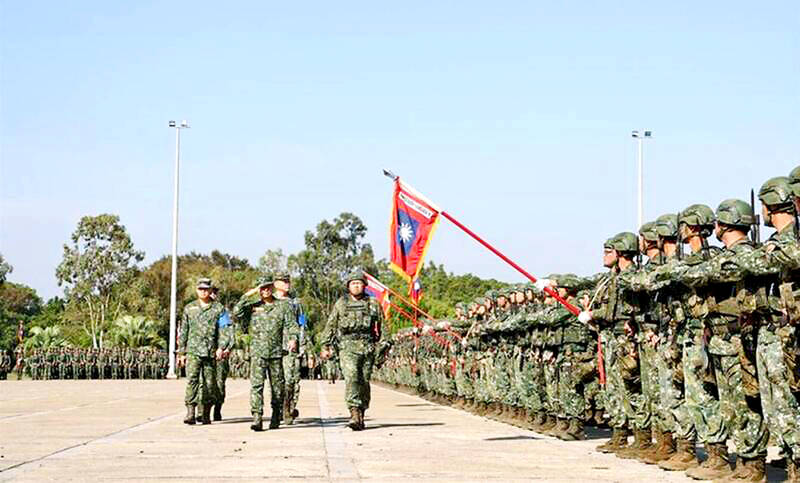Two army brigades launched a week-long live-fire exercise in central Taiwan on Saturday after a six-year hiatus to test the combat readiness of ground troops amid the rising military threat from China.
The seven-day drill carried out by the Taoyuan-based 269th Mechanized Infantry Brigade and the Kaohsiung-based Republic of China (ROC) Marine Corps’ 99th brigade simulates combat scenarios in Chiayi County, with the central Taiwan-based 10th Army Corps Command presiding over the exercise.
According to the scenario, the 269th Mechanized Infantry Brigade is designated the defending “blue team” while the 99th brigade acts as the invading “red team.”

Photo courtesy of Military News Agency
The ongoing drill titled “Chang Ching” (長青), or “evergreen,” is to test the command efficiency of both brigades.
This is the first time since 2017 a Chang Ching drill has been held independently. In the past five years, the army incorporated the Chang Ching drill into other annual military exercises.
Institute for National Defense and Security Research fellow Su Tzu-yun (蘇紫雲) said the army used to hold annual Chang Ching exercise in central Taiwan, Chang Tai (長泰) in northern Taiwan, and Chang Shang (長勝) in southern Taiwan to test troops’ joint-exercise capabilities to combat a Chinese invasion.
The brigade-level exercise tests whether each unit is sufficiently trained on intelligence, command, interception, communication and logistic support in the event of a cross-Taiwan Strait war, Su said.
In the ongoing Chang Ching drill, the 269th Mechanized Infantry Brigade is equipped with variants of the domestic Clouded Leopard armored vehicle, as well as the latest drones, which are expected to undergo rigorous tests during the week-long exercise, Su said.
US military consultants are likely to preside over the exercises with Taiwanese military personnel, he added.

Taiwan is stepping up plans to create self-sufficient supply chains for combat drones and increase foreign orders from the US to counter China’s numerical superiority, a defense official said on Saturday. Commenting on condition of anonymity, the official said the nation’s armed forces are in agreement with US Admiral Samuel Paparo’s assessment that Taiwan’s military must be prepared to turn the nation’s waters into a “hellscape” for the Chinese People’s Liberation Army (PLA). Paparo, the commander of the US Indo-Pacific Command, reiterated the concept during a Congressional hearing in Washington on Wednesday. He first coined the term in a security conference last

Prosecutors today declined to say who was questioned regarding alleged forgery on petitions to recall Democratic Progressive Party (DPP) legislators, after Chinese-language media earlier reported that members of the Chinese Nationalist Party (KMT) Youth League were brought in for questioning. The Ministry of Justice Investigation Bureau confirmed that two people had been questioned, but did not disclose any further information about the ongoing investigation. KMT Youth League members Lee Hsiao-liang (李孝亮) and Liu Szu-yin (劉思吟) — who are leading the effort to recall DPP caucus chief executive Rosalia Wu (吳思瑤) and Legislator Wu Pei-yi (吳沛憶) — both posted on Facebook saying: “I

The Ministry of Economic Affairs has fined Taobao NT$1.2 million (US$36,912) for advertisements that exceed its approved business scope, requiring the Chinese e-commerce platform to make corrections in the first half of this year or its license may be revoked. Lawmakers have called for stricter enforcement of Chinese e-commerce platforms and measures to prevent China from laundering its goods through Taiwan in response to US President Donald Trump’s heavy tariffs on China. The Legislative Yuan’s Finance Committee met today to discuss policies to prevent China from dumping goods in Taiwan, inviting government agencies to report. Democratic Progressive Party Legislator Kuo Kuo-wen (郭國文) said

The Ministry of Economic Affairs has fined Taobao NT$1.2 million (US$36,900) for advertisements that exceeded its approved business scope and ordered the Chinese e-commerce platform to make corrections in the first half of this year or its license would be revoked. Lawmakers have called for stricter supervision of Chinese e-commerce platforms and more stringent measures to prevent China from laundering its goods through Taiwan as US President Donald Trump’s administration cracks down on origin laundering. The legislature’s Finance Committee yesterday met to discuss policies to prevent China from dumping goods in Taiwan, inviting government agencies to report on the matter. Democratic Progressive Party